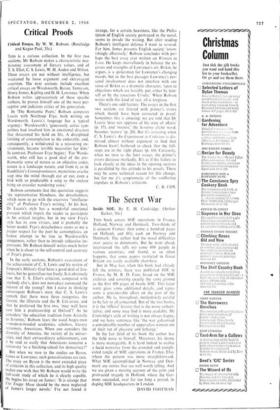Critical Proofs
Critical Essays. By W. W. Robson. (Routledge and Kegan Paul, 35s.)
THIS is a curious collection. In the first two sections, Mr Robson makes a characteristic neo- Scrutiny assessment of literary values, and of
T. S. Eliot, C. S. Lewis, W. H. Auden and Milton. These essays are not without intelligence, but weakened by loose argument and extravagant assertion. The next sections include excellent critical essays on Wordsworth, Byron, Tennyson, Henry James, Kipling and D. H. Lawrence. When Robson writes appreciatively of these specific authors, he proves himself one of the most per- ceptive and judicious critics of his generation.
In 'The Romantic Poets,' Robson compares Leavis with Northrop Frye, both writing on Wordsworth. Leavis's language has a typical urgency: Wordsworth's 'generously active sym- pathies had involved him in emotional disasters that threatened his hold on life. A disciplined limiting of contemplation to the endurable, and, consequently, a withdrawal to a reassuring en- vironment, became terrible necessities for him.' In contrast, Professor Frye begins: 'For Words- worth, who still has a good deal of the pre- Romantic sense of nature as an objective order, nature is a landscape nature, and from it, as in Baudelaire's Correspondances, mysterious oracles seep into the mind through eye or ear, even a bird with so predictable a song as the cuckoo being an oracular wandering voice.'
Robson comments that this quotation suggests 'the representative blandness, the detachedness, which seem to go with the excessive "intellectu- ality" of Professor Frye's writing.' At his best, Dr Leavis's style has a wonderful emotional pressure which impels the reader to participate in his critical insights, but in my view Frye's style has its own virtues, and is probably the better model. Frye's detachedness seems to me a proper respect for the poet he contemplates, an honest attempt to be true to Wordsworth's uniqueness, rather than to intrude subjective im- pressions. Mr Robson himself writes much better when he is closer to the self-control and accuracy of Frye's prose.
In the early sections, Robson's assessment of the achievement of C. S. Lewis and his review of Empson's Milton's God have a good deal of live- liness, but he generalises too freely. Is it obviously true that T. S. Eliot's criticism, compared with anybody else's, does not nowadays command the interest of the young? Am 1 naïve in thinking extravagant Robson's story that C. S. Lewis's remark that there were three categories, the literate, the illiterate and the B. Litt.-erate, and that he preferred the first two, 'may well have cost him a professorship at Oxford'? As he considers 'the education tradition from Aristotle to Scrutiny,' Robson fears the usual bogey-men —modern-minded academics, scholars, literary reviewers, Americans. When one considers the diversity of America, the variety of its univer- sities, and their extraordinary achievements, can it be said so easily that Americans conceive a university 'as a finishing-school for democracy?'
But when we turn to the studies on Byron, James or Lawrence, such generalisations are rare. The essay on Byron is the most extended piece of criticism in this collection, and its high quality makes one wish that Mr Robson would write the full-scale study of which he is clearly capable. He begins his essay on James: 'It is strange that The Tragic Muse should be the most neglected of James's longer novels.' I've not found it strange, for a certain heaviness, like the Philis- tinism of English society portrayed in the novel, seems to invade the writing. But after reading Robson's intelligent defence I want to re-read. For him, James presents English society 'aston- ishingly effectively.' Robson concludes with per- haps the best essay ever written on Women in Love. He keeps marvellously in balance the ex- cesses and strengths of Lawrence's art. Birkin, he argues, is a spokesman for Lawrence's changing moods, but in the best passages Lawrence's per- sonal involvement does not interfere with our sense of Birkin as a dramatic character, 'open to objections which are forcibly put, either by him- self or by the tenacious Ursula.' When Robson writes with this kind of tact, all is forgiven.
There's one odd feature. The essays in the first two sections are littered with printer's errors which should have been corrected in proof. Sometimes this is amusing; we are told that Dr Leavis 'does not approve of his state of affairs' (p. 17), and 'mature,' the Scrutiny cliche word, becomes 'nature' (p. 20). But it's irritating when C. S. Lewis's An Experiment in Criticism is dis-
missed almost without argument to find that Robson hasn't bothered to check that the full- stops are in the right places (p. 66). Curiously, when we turn to the later essays, the printer's errors decrease markedly. It's as if his failure to look closely at the ideas in the opening sections
is paralleled by this attitude to his proofs. There may be some technical reason for this change, but for me it's symptomatic of the conflicting impulses in Robson's criticism.
C. B. COX


































 Previous page
Previous page